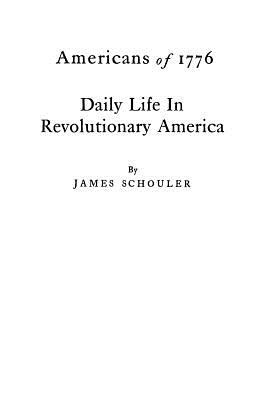
- We will send in 10–14 business days.
- Author: James Schouler
- Publisher: Genealogical Publishing Company
- ISBN-10: 0806351624
- ISBN-13: 9780806351629
- Format: 14 x 21.6 x 1.8 cm, softcover
- Language: English
- SAVE -10% with code: EXTRA
Reviews
Description
Much has been written about the military campaigns and leaders of the American Revolution. However, how many people know that ladies' handkerchiefs from that period were either flower-bordered or checked; that Boston led all the colonial towns in public cleanliness, while Philadelphia's streets were so dusty or muddy, depending on the weather, that the city was given the sobriquet "Filthy-dirty"; that essence of pearl was a common dentifrice of the day and rum was widely commended for medicinal use; or that the citizens of Revolutionary America ate too fast, and the hot bread and biscuits that they consumed brought on dyspepsia. James Schouler's "Americans of 1776" is not a typical narrative history of the Revolution but rather a unique and fascinating study of the daily life and manners of the Revolutionary period, intended to bring out "some features of an heroic age and its people, which should interest posterity and yet are unfamiliar to us."
EXTRA 10 % discount with code: EXTRA
The promotion ends in 18d.20:55:38
The discount code is valid when purchasing from 10 €. Discounts do not stack.
- Author: James Schouler
- Publisher: Genealogical Publishing Company
- ISBN-10: 0806351624
- ISBN-13: 9780806351629
- Format: 14 x 21.6 x 1.8 cm, softcover
- Language: English English
Much has been written about the military campaigns and leaders of the American Revolution. However, how many people know that ladies' handkerchiefs from that period were either flower-bordered or checked; that Boston led all the colonial towns in public cleanliness, while Philadelphia's streets were so dusty or muddy, depending on the weather, that the city was given the sobriquet "Filthy-dirty"; that essence of pearl was a common dentifrice of the day and rum was widely commended for medicinal use; or that the citizens of Revolutionary America ate too fast, and the hot bread and biscuits that they consumed brought on dyspepsia. James Schouler's "Americans of 1776" is not a typical narrative history of the Revolution but rather a unique and fascinating study of the daily life and manners of the Revolutionary period, intended to bring out "some features of an heroic age and its people, which should interest posterity and yet are unfamiliar to us."


Reviews